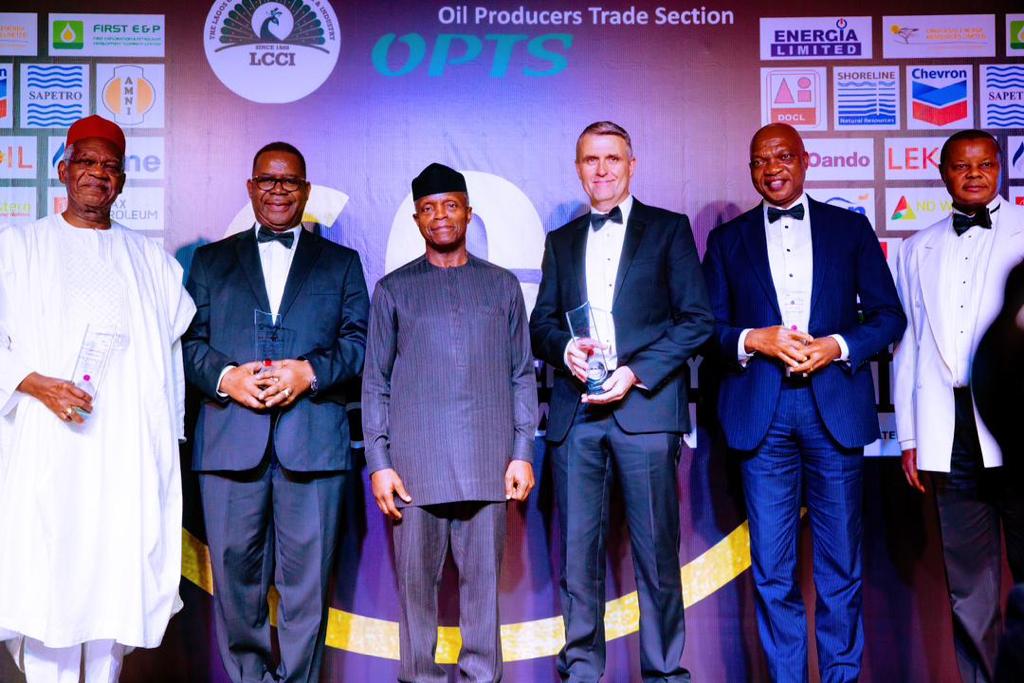More private sector participation in Nigeria’ transition to green energy is crucial as it will help the country achieve its objectives in the implementation of its Energy Transition Plan, according to Vice President Yemi Osinbajo, SAN.
Prof. Osinbajo stated this in Lagos while delivering the keynote address at the 60th Anniversary Dinner of the Oil Producers Trade Section (OPTS) of the Lagos Chamber of Commerce and Industry (LCCI), on Thursday.
Speaking on the topic: “Nigeria: Transitioning to Green Energy”, the Vice President highlighted the Energy Transition Plan as “a comprehensive, data-driven and evidence-based plan, designed to deal with the twin crises of climate change and energy poverty.”
“We anchored the plan on key objectives, including lifting 100 million people out of poverty in a decade, driving economic growth, bringing modern energy services to the full population and managing the expected long-term job loss in the oil sector due to global decarbonization.
“The Private sector must up its participation in the transition to Green energy journey,” Prof. Osinbajo stated, adding that this includes “greater involvement in the crucial conversations about what an economically just transition to zero emissions should be,” he said.
Buttressing the need for more private sector participation in the Energy Transition Plan implementation, the VP pointed out that the off-grid Solar space in Nigeria “is becoming one of the most exciting in the world.”
According to the Vice President “we have programmes such as the Federal Government of Nigeria’s Solar Power Naija (under its Economic Sustainability Plan), the Nigerian Electrification Programme with the World Bank Group and the African Development Bank, and also the Rural Electrification Fund providing almost $1 billion in financing and subsidies to drive 10 million connections. We are also working on clear guidelines for on-grid Solar before COP-27 to initially provide the structure for the rollout of at least 1,000MW.”
Adding that the private sector should also get involved in climate finance, especially the voluntary carbon markets, among others, Prof. Osinbajo urged the OPTS “to take the lead in Solar to help drive improvements in our energy mix and also accelerate the transition to having “energy” companies, not just oil companies.”
“We are particularly pleased with the good work that All-On and Konexa have been doing all with funding from Shell (a key OPTS member). We also have NNPC partnering with the Rural Electrification Agency to rollout Solar Mini-grids and Solar Home Systems across the country,” he further said.
Aside from the need for more private sector participation in Nigeria’s energy transition plan, the impact of climate change on the African continent, need to support fossil fuel projects in developing countries, and debt-for-climate swap deals were major highlights of the Vice President’s speech at the event.
Speaking further on the topic, the Vice President noted that climate change may likely be the most consequential subject globally in the next few decades, even as the significance of reducing global emissions to zero come to the fore.
Noting the effects of global climate crisis such as floods, desertification, rising water levels and record high temperatures, Prof. Osinbajo stated that the developing countries are faced with two challenges; climate change and extreme poverty.
Restating the importance of using gas as a transition fuel for Nigeria and others developing countries, he highlighted six aspects in reducing global net emissions to zero, as it relates to the developing world.

 Join Daily Trust WhatsApp Community For Quick Access To News and Happenings Around You.
Join Daily Trust WhatsApp Community For Quick Access To News and Happenings Around You.


